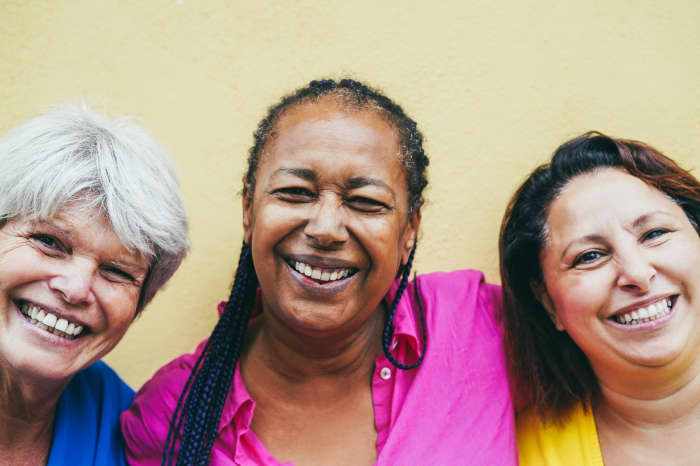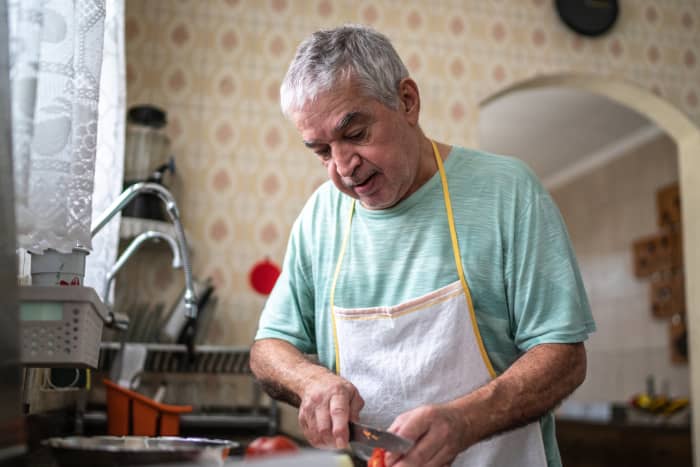One of the difficulties some people encounter in retirement is losing friends and loved ones. It’s why having a supportive partner and adult children can be such a balm (I’m very lucky to have both).
It’s also why being one of America’s roughly five million solo agers (single and childless adults, formerly called “elder orphans”) age 65 to 74 can be so hard in retirement.
Experts, however, have some smart recommendations on ways solo agers can thrive, as I’ll share momentarily.
Concerns of solo agers
But I first want to note a few troubling findings in a recent AARP survey of solo agers of solo agers who are 50+:
- They’re more concerned about a variety of aspects of aging than other 50+ adults. In the study, 78% of solo agers were concerned about losing their independence and having to rely on others and 61% were concerned about being alone without family or friends.
- Only 57% are satisfied with the number of friends they have.
- Compared with a similar survey in 2020, a higher percentage of solo agers are now worried about three key topics. They’re more worried about needing money, managing bills and having their possessions distributed according to their wishes.
Read: ‘It’s just a nice place for an old guy to go’: Men’s Sheds offer camaraderie and connection
A Census Bureau study showed the poverty rate is significant among the nation’s solo women aged 65 and older — roughly 15% for white women, 28% for Black women, 33% for Asian women and 39% for Hispanic women.
LGBTQ+ solo agers “have significantly more holistic health and aging challenges than their contemporaries,” Karen McPhail, director of the Aging Rainbows advocacy organization for LGBTQ+ older adults, noted in the Generations Journal on solo aging. LGBTQ+ older adults are twice as likely to live alone and four times as likely to have no children than other older adults.
LGBTQ+ solo agers “have significantly more holistic health and aging challenges than their contemporaries,” noted Karen McPhail, founder and director of the Aging Rainbows advocacy organization for LGBTQ+ older adults, LGBTQ+ older adults are twice as likely to live alone and four times as likely to have no children that other older adults.
Read: ‘No regrets’: At 80, this woman has no kids and no fears of being lonely or uncared for
“Solo agers are facing some challenges and concerns that have grown over time, but there are a lot of indications that they’re a really resilient and content population,” said Vicki Levy, who worked on the report and is AARP’s consumer insights manager.

Just because you’re a solo ager doesn’t mean you have to go it alone.
Getty Images/iStockphotoWho can you count on?
“The only people who are morally obligated to take care of you are people in your family or relatives. If you’re a solo ager and don’t have them waiting in the wings, it’s important to figure out who you can count on.” said Sara Zeff Geber, author of “Essential Retirement Planning for Solo Agers” said at the American Society on Aging annual conference.
A local support system is a key component of strong psychological health, noted a 2022 American Psychological Association study, cited in Generations Journal.
Adult children, Geber added, can typically provide things like medication management, help with activities of daily living, legal representation, assistance with real-estate transactions and other residential decisions, bill paying and related financial decisions and just social and moral support.
The two most critical questions solo agers need help to answer, said Geber: Where am I going to live and who are my [financial and medical] proxies?
“With the oldest boomers turning 77 this year, we are just seeing the beginning of this monumental challenge,” Geber said.
The need for solo agers to prepare for the future
What concerned me most about the AARP solo ager survey: How few solo agers are preparing for their futures.
A striking 81% haven’t planned for ongoing living assistance and just 41% have a living will or advance treatment directive (down from 50% in 2020 and compared with 51% of the general 50+ population).
“We certainly saw evidence of a lack of planning for the majority of these folks,” said Levy.
Why is that?
“We might speculate that there might not be a clear-cut individual they could go to and have them serve in that role,” Levy noted. “Solo agers were more likely than adults 50+ overall to say they felt isolated and lonely. They’re, in general, less connected to others and to a community that could be helping and supporting them.”
What many male solo agers need
A lack of a support system is often the case for solo ager men, I’ve been told. It’s one reason former financial planner Michael Kay formed the “Chapter X” online support group for men in retirement.
“Most of us solo ager men feel a lot lonelier and more isolated than we care to admit,” said Jackson Rainer, a clinical psychologist and solo ager at the American Society on Aging panel. “We don’t want to admit our vulnerability.”
Read: Am I lonesome? ‘I’m fine. I’m fine.’ How single men can prepare to age alone.
Levy told me: “The solo aging male population is certainly in need of community.”
Experts recommend solo agers in retirement proactively find people who can one day help managing their finances or health, not to mention providing emotional support right now. “Reach out to others,” Rainer advised.
Where to find support
You might find these types of people in your extended family, community, through a religious organization you’re in or from volunteering and maybe even former work colleagues, Geber said at the panel.
In AARP’s survey, siblings, nieces and nephews were often people solo agers turned to for assistance.
You can also go to a financial adviser, lawyer or patient advocate, Rainer noted. Care managers known as aging life care professionals and certified senior advisers can offer support, too.
Read: ‘It’s the greatest gift.’ Animal-rescue group matches older adults with senior pets.
These types of professionals can be especially useful helping you draft documents like a power of attorney or medical directive giving someone you trust the authority to make decisions for you if you become unable.
AARP also has resources for solo agers on its site, including an upcoming free online webinar about advance care planning (AARP membership not required).
It’s a good idea for solo agers to make a list of close friends and peers to call or text when needed and to share that list with other neighbors and peers, solo ager Carol Marak wrote in Generations Journal.
Small groups of solo agers in Minnesota have been testing out “The Backup Plan” model, developing an expert-led community of support. (You can find out more about it by contacting Linda Camp at thebackupplan2@gmail.com.)
The positive side of being a solo ager
Incidentally, AARP learned that 55% of solo agers it surveyed liked being independent and 41% said the best thing about living alone was freedom (the worst thing: loneliness). People 70+ were more likely to say they were satisfied as solo agers than people in their 50s and 60s.
“In general, we’re seeing positive words come out before negative ones,” Levy said.
My take: Solo agers are often happy when things are going well for them but fearful about the potential for things to go very wrong.
If you’re a solo ager in retirement, I hope things do go well for you. But just in case: find some support.







